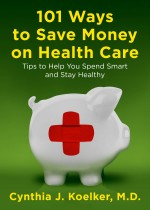![650px-HAWKBEARD[1]](http://101waystosavemoneyonhealthcare.info/wp-content/uploads/2011/09/650px-HAWKBEARD1-150x150.jpg) Do you plan your day according to the pollen count? Does the sight of a flowering tree fill you with dread?
Do you plan your day according to the pollen count? Does the sight of a flowering tree fill you with dread?
Though cooler weather bids us outside, those who suffer from allergies are hesitant to accept the invitation. Is a stroll around the block worth a sinus headache? Will your eyes itch for a week after a walk in the park?
As a family doctor suffering from allergies myself, I have great sympathy for those who struggle with itchy, watery eyes, a stuffy nose, post-nasal drainage, or an allergic cough. It’s no fun to feel like you have a cold when you’re not even infected. At least a virus would be gone in a week. Allergies can last for months.
Short of seeing a physician, is there something a person can do to help himself?
Definitely. Most people don’t actually need to see a doctor. Years ago you’d have to see a physician to obtain the best allergy medications. Today most are available over-the-counter at very reasonable prices.
Of course, there are ways to help yourself without taking medication – and for free. A shower after mowing will wash the offending grass and pollen from your skin and hair. Rinsing your nose and eyes will help minimize nasal congestion and allergy eyes. Keeping the windows closed and air conditioning on will lessen your reaction to outdoor allergens.
Beyond that, medications can be extremely helpful, and most are inexpensive. OTC drugs that help with allergies include antihistamines, decongestants, expectorants, eye drops, and nose sprays. There are only a few classes of drugs that remain by prescription only, specifically steroid inhalers and asthma medications. The rest have been approved for over-the-counter use. You just need a little know-how to reap major benefits.
Antihistamines taken by mouth are the mainstay of allergy treatment. The advantage of oral antihistamines is they have the potential to help multiple symptoms at multiple sites: itchy or watery eyes, runny nose, itchy skin, hives, post-nasal drainage and cough due to drainage. The primary disadvantage is that some people experience drowsiness with certain antihistamines, especially diphenhydramine, chlorpheniramine, or doxylamine. If your allergies keep you awake at night, however, drowsiness can be a good thing.
Two newer OTC antihistamines, cetirizine and loratadine, were by prescription until just a few years ago and are less likely to make a person drowsy. Both work well for allergies, though cetirizine probably works better than loratadine for similar symptoms due to colds.
None of these antihistamines is expensive in generic form. If you have trouble finding them using the generic names listed above, ask any pharmacist to help you.
If your only allergy symptom is a runny nose, cromolyn sodium nasal spray may lessen your reaction to pollen. It, too, was by prescription years ago, and is most similar to nasal steroid sprays such as fluticasone – but much less expensive. Like the nasal steroids, cromolyn is intended to be used daily to prevent allergic reactions, rather than to treat acute situations.
If itchy eyes are the problem, try an eye drop containing pheniramine or ketotifen. These medications may be used as-needed, either before exposure to pollen to lessen your reaction, or to relieve symptoms once they occur.
Decongestants help a stuffy nose more than a runny nose. The decongestants open the airways by reducing swelling in the tissues lining the nose and sinuses. Pseudoephedrine is the most effective OTC medication, but you’ll need to ask the pharmacist for it. It is often kept “behind the counter.” Some people experience insomnia, anxiety, or palpitations when using decongestants, so be cautious if you already suffer from these conditions.
If you’re allergic and planning to mow the grass, spread mulch, go for a hayride or horseback ride, it would be a good idea to pre-medicate with an antihistamine and/or a decongestant.
Some allergic patients benefit from using an expectorant (guaifenesin), which thins mucus, thereby allowing it to drain more easily. Sometimes cough suppressants are useful. Dextromethorphan, which suppresses the body’s urge to cough, is the ingredient in over-the-counter cough medications.
For additional information, consult your local pharmacist, who should be well-equipped to answer your questions about which medication is right for you. Only if these over-the-counter medications are ineffective would you need to see your doctor.
© Cynthia J Koelker, MD – All rights reserved
http://www.101waystosavemoneyonhealthcare.com/


